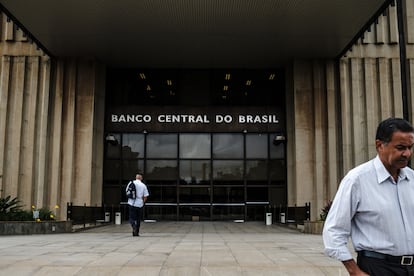Pedestrians pass in front of the headquarters of the Central Bank of Brazil, in Brasilia.Gustavo Gomes (Bloomberg)
Latin American countries have passed a first test.
Last week, the US central bank, the Federal Reserve, raised its benchmark interest rates by 75 basis points, ending an era of cheap credit with near-zero rates.
Although the markets were already expecting it, there was a fear that the emerging economies would suffer a destabilization of their financial systems.
In Latin America, this was not the case as the monetary authorities had prepared the ground for this moment.
But the road is not completely covered, according to specialists.
2021 was a good year for stock markets, boosted by the unprecedented resources that the United States injected into the financial system to recover the economic activity lost due to the pandemic.
This bull cycle came to an end in December, when inflation originally thought to be “transient” proved persistent and markets began to expect a rate hike and stimulus withdrawal.
During this time, and gradually, some Latin American currencies depreciated against the dollar.
However, as the Fed approved an unprecedented hike in nearly 30 years last Wednesday, currencies in the region appreciated slightly before leveling off.
This behavior surprised Axel Christensen, director of investment strategy for Latin America at Blackrock, the world's largest investment fund manager, who has been analyzing the markets for 25 years.
“I was surprised that, despite the fact that the Federal Reserve has already been on the path of raising interest rates for a few months, including the most recent sharp adjustment, emerging assets, particularly in Latin America, have resisted quite well. ”, says Christensen in a video call from Chile.
"I have enough years in this to remember that when this happened in the past, it really affected Latin America very badly."
This moment caught the region prepared.
Central banks have been raising interest rates consistently since March last year in an attempt to contain rising prices caused first by disruptions in global supply chains and now by the war in Ukraine.
The rate of 13.25% in Brazil is the highest in the region and is expected to continue rising.
While the purpose of the hike is to "cool" the economy to contain inflation, the higher rates also offer attractive returns to global capital, preserving investor appetite and preventing a sudden outflow of capital.
Inflation has also given some countries a break.
"More dollars are coming in because a barrel of oil is more expensive, as well as a ton of soybeans and a pound of copper, for example," says Christensen.
"The terms of trade are somewhat more favorable," she adds.
At this point, says Christensen, it is valid to identify a certain advantage that the region has in dealing with some of the current problems.
From the hyperinflations of the 1980s, known as the tequila crisis, in which a devaluation of the Mexican peso generated a global financial crisis, to debt defaults in Argentina, the region has accumulated experience.
"The economies and, above all, the companies in Latin America have knowledge and experience handling situations of interest rate hikes, particularly when they are caused by high inflation," says Christensen.
“In a well-established company in Brazil, for example, you can find a CFO or a treasurer who has already seen this movie and brings some experience.
Someone who knows how to manage their budget, what about inflation, how much can be translated into consumer prices.
And I think this difference is in stark contrast to a CFO in Germany, for example, who has probably never seen 8% inflation in his life and who, until recently, was paid by the investor to hold his debt, because nominal rates were negative. ”.
“I would tell a German or French
headhunter
looking for CFOs in Latin America that they probably have better experience running this aspect of the business than the French or Germans themselves,” Christensen adds.
systemic risk
The other side of this coin is that financial conditions have tightened, explains Luis Gonzali, a debt and macroeconomics strategist at the firm Franklin Templeton in Mexico City.
“The best way to see the deterioration is in
credit default swaps
, which have risen, and that makes it much more difficult to finance themselves,” says the specialist, “if you add to that that many countries borrowed heavily in the pandemic , what you have is a much more complex debt service going forward than they had two or three years ago”.
Credit default swaps
, known by their acronym CDS, are
instruments used to bet that a company or a country will default on its debt and can also serve as insurance.
If, for example, the price of a CDS on Colombian sovereign debt rises (as it has been doing this year) this indicates that more and more investors believe that it is necessary to protect themselves from a possible default.
At the time that this company or country wants to issue more debt, buyers look at the CDS to measure their risk and define an interest rate.
Right now, the most alarming CDS is Turkey's sovereign debt.
One of the world's largest emerging economies, the country has spent years trying to contain capital outflows, spending its international reserves to defend its currency.
The maturity of its short-term debt, which is equivalent to 16% of its gross domestic product (GDP), is approaching and its reserves are only enough to pay 45%, Gonzali points out.
To pay the rest, the country will have no choice but to go to the markets and issue expensive debt.
"Turkey is very integrated into the global economy and that is why I am worried about a possible debacle there," adds Gonzali, "it could bring serious problems, if not systemic."
The risk that Gonzali refers to is contagion.
When an emerging market
defaults
, the possibility of a domino effect causes many investors to withdraw their capital from other emerging countries, depreciating their currency and increasing interest rates on bonds.
An event like this could end the Fed's rate hike.
“Historically, if you look at the last 40 years, it's been like this: the Fed stops going higher when something breaks.
What can be broken?
An emerging market, perhaps, or a credit event.
So, I think that this is still missing and the ugly is just beginning”, says Gonzali.
Christensen agrees that the road is long and this is only the beginning.
"The Fed is just beginning, we don't know how far it will go and the countries of the region face important challenges," he says, "despite the fact that they have resisted well so far, I still don't have the courage to approve the two students, neither to the Fed, nor to the emerging markets of Latin America, until we see how the complete examination ends”.
In the short term, higher interest rates will result in a couple of years of very low growth.
In addition, the political component has already brought great changes to the region.
In the last presidential elections, countries have punished the center or right-wing ruling party by voting for the opposition.
Argentina, Bolivia, Chile, Peru, Venezuela and Colombia, the six largest countries in South America, elected leftist governments.
“There are political cycles, that is and is part of investing in emerging markets,” Christensen points out, “but what will be the structural changes, changes in regulations, for example, changes in the Constitution, that is what can eventually also affect the vision that investors have.


/cloudfront-eu-central-1.images.arcpublishing.com/prisa/ZU5KUJFBSRGVVM2SXJTZBZP3XI.jpg)
/cloudfront-eu-central-1.images.arcpublishing.com/prisa/2VA2ALVO6BDXLM22W73UWN5GDY.jpg)


/cloudfront-eu-central-1.images.arcpublishing.com/prisa/Q6UJ4IEP6ZGLZLS3MSHF7LNYOU.jpg)

